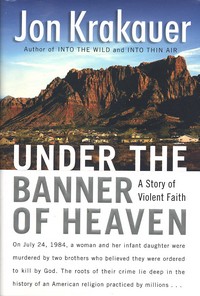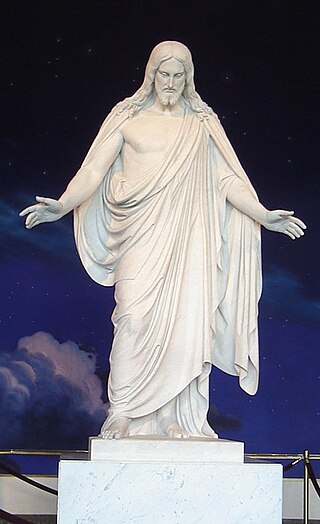Related Research Articles

The Church of Jesus Christ of Latter-day Saints, informally known as the LDS Church or Mormon Church, is a nontrinitarian Christian church that considers itself to be the restoration of the original church founded by Jesus Christ. The church is headquartered in the United States in Salt Lake City, Utah, and has established congregations and built temples worldwide. According to the church, it has over 16.8 million members and 54,539 full-time volunteer missionaries. As of 2012, the church was the fourth-largest Christian denomination in the United States, and reported over 6.7 million US members as of 2021. It is the largest denomination in the Latter Day Saint movement founded by Joseph Smith during the early 19th-century period of religious revival known as the Second Great Awakening.

Mormons are a religious and cultural group related to Mormonism, the principal branch of the Latter Day Saint movement started by Joseph Smith in upstate New York during the 1820s. After Smith's death in 1844, the movement split into several groups following different leaders; the majority followed Brigham Young, while smaller groups followed Joseph Smith III, Sidney Rigdon, and James Strang. Most of these smaller groups eventually merged into the Community of Christ, and the term Mormon typically refers to members of the Church of Jesus Christ of Latter-day Saints, as today, this branch is far larger than all the others combined. People who identify as Mormons may also be independently religious, secular, and non-practicing or belong to other denominations. Since 2018, the LDS Church has requested that its members be referred to as "Latter-day Saints".

Mormonism is the religious tradition and theology of the Latter Day Saint movement of Restorationist Christianity started by Joseph Smith in Western New York in the 1820s and 1830s. As a label, Mormonism has been applied to various aspects of the Latter Day Saint movement, although there has been a recent push from the Church of Jesus Christ of Latter-day Saints to distance themselves from this label. A historian, Sydney E. Ahlstrom, wrote in 1982, "One cannot even be sure, whether [Mormonism] is a sect, a mystery cult, a new religion, a church, a people, a nation, or an American subculture; indeed, at different times and places it is all of these." However, scholars and theologians within the Latter Day Saint movement, including Smith, have often used "Mormonism" to describe the unique teachings and doctrines of the movement.

Polygamy was practiced by leaders of the Church of Jesus Christ of Latter-day Saints for more than half of the 19th century, and practiced publicly from 1852 to 1890 by between 20 and 30 percent of Latter-day Saint families. Today, various denominations of fundamentalist Mormonism continue to practice polygamy.

The Latter Day Saint movement is the collection of independent church groups that trace their origins to a Christian Restorationist movement founded by Joseph Smith in the late 1820s.

Mormon fundamentalism is a belief in the validity of selected fundamental aspects of Mormonism as taught and practiced in the nineteenth century, particularly during the administrations of Joseph Smith, Brigham Young, and John Taylor, the first three presidents of the Church of Jesus Christ of Latter-day Saints. Mormon fundamentalists seek to uphold tenets and practices no longer held by mainstream Mormons. The principle most often associated with Mormon fundamentalism is plural marriage, a form of polygyny first taught in the Latter Day Saint movement by the movement's founder, Smith. A second and closely associated principle is that of the United Order, a form of egalitarian communalism. Mormon fundamentalists believe that these and other principles were wrongly abandoned or changed by the LDS Church in its efforts to become reconciled with mainstream American society. Today, the LDS Church excommunicates any of its members who practice plural marriage or who otherwise closely associate themselves with Mormon fundamentalist practices.

Under the Banner of Heaven: A Story of Violent Faith is a nonfiction book by author Jon Krakauer, first published in July 2003. He investigated and juxtaposed two histories: the origin and evolution of the Church of Jesus Christ of Latter-day Saints and a modern double murder committed in the name of God by brothers Ron and Dan Lafferty, who subscribed to a fundamentalist version of Mormonism.

Mormon cinema usually refers to films with themes relevant to members of the Church of Jesus Christ of Latter-day Saints. The term has also been used to refer to films that do not necessarily reflect Mormon themes but have been made by Mormon filmmakers. Films within the realm of Mormon cinema may be distinguished from institutional films produced by the LDS Church, such as Legacy and Testaments, which are made for instructional or proselyting purposes and are non-commercial. Mormon cinema is produced mainly for the purposes of entertainment and potential financial success.
Ex-Mormon or post-Mormon refers to a disaffiliate of the Church of Jesus Christ of Latter-day Saints or any of its schismatic breakoffs, collectively called "Mormonism". Ex-Mormons—sometimes referred to as exmo or postmo—may neither believe in nor affiliate with the LDS Church. In contrast, Jack Mormons may believe but do not affiliate; and cultural Mormons may or may not affiliate but do not believe in certain doctrines or practices of the LDS Church. The distinction is important to a large segment of ex-Mormons, many of whom consider their decision to leave as morally compelling and socially risky. According to 2014 Pew data, around 1/3 of adults raised LDS no longer adhere to the faith and in 2008 only 25% of LDS young adults are actively involved. Many ex-Mormons experience troubles with family members who still follow Mormon teachings. Aggregations of ex-Mormons may comprise a social movement.

Jo Ann Barnett Shipps, known as Jan Shipps, is an American historian specializing in Mormon history, particularly in the latter half of the 20th century to the present. Shipps is generally regarded as the foremost non-Mormon scholar of the Latter Day Saint movement, having given particular attention to the Church of Jesus Christ of Latter-day Saints. Her first book on the subject was Mormonism: The Story of a New Religious Tradition published by the University of Illinois Press. In 2000, the University of Illinois Press published her book Sojourner in the Promised Land: Forty Years Among the Mormons, in which she interweaves her own history of Mormon-watching with 16 essays on Mormon history and culture.
Latter Day Saints and Mormons have been portrayed in popular media many times. These portrayals often emphasize controversy such as polygamy or myths about the Church of Jesus Christ of Latter-day Saints and other branches of the Latter Day Saint movement.
The Mormons is a four-hour PBS documentary about the Church of Jesus Christ of Latter-day Saints. The production originally aired in two-hour segments on April 30 and May 1, 2007. It was produced by Helen Whitney, and was the first joint production of Frontline and American Experience.

Joseph Freeman Jr. was the first man of black African descent to receive the Melchizedek priesthood and be ordained an elder in the Church of Jesus Christ of Latter-day Saints after the announcement of the 1978 Revelation on Priesthood, which allowed "all worthy male members of the Church" to "be ordained to the priesthood without regard for race or color."
Mormon studies is the interdisciplinary academic study of the beliefs, practices, history and culture of individuals and denominations belonging to the Latter Day Saint movement, a religious movement associated with the Book of Mormon, though not all churches and members of the Latter Day Saint movement identify with the terms Mormon or Mormonism. Denominations of the Latter Day Saint movement include the Church of Jesus Christ of Latter-day Saints, by far the largest, as well as the Community of Christ (CoC) and other smaller groups, include some categorized under the umbrella term Mormon fundamentalism.

Since Mormonism’s foundation, Black people have been members, however the church placed restrictions on proselytization efforts among black people. Before 1978, black membership was small. It has since grown, and in 1997, there were approximately 500,000 black members of the church, mostly in Africa, Brazil and the Caribbean. Black membership has continued to grow substantially, especially in West Africa, where two temples have been built. By 2018, an estimated 6% of members were black worldwide. In the United States, approximately 1% of members are black.

The John Whitmer Historical Association (JWHA) is an independent, nonprofit organization promoting study, research, and publishing about the history and culture of the Latter Day Saint movement. It is especially focused on the Community of Christ, other midwestern Restoration traditions, and early Mormonism. The Community of Christ's approach to its own history was influenced, in part, by historical problems raised and explored through JWHA publications and conferences, and those of its sister organization, the Mormon History Association. JWHA membership numbers around 400 and is open to all, fostering cooperation with LDS and non-Mormon scholars.
Reid Larkin Neilson was the managing director of the Church History Department of the Church of Jesus Christ of Latter-day Saints from 2010 to 2019. On January 23, 2015, he became an Assistant Church Historian and Recorder, still retaining his duties as managing director.

The following outline is provided as an overview of and a topical guide to the Church of Jesus Christ of Latter-day Saints.
This is a bibliography of works on the Latter Day Saint movement.
This is a bibliography of literature treating the topic of criticism of Mormonism, sorted by alphabetical order of titles.
References
- ↑ Flap copy, Latter Days: A Guided Tour Through Six Billion Years of Mormonism (St. Martin's Press, 2001)
- ↑ https://www.amazon.com/gp/pdp/profile/AWO7P2LAIOPSV Amazon.com reviewer profile
- ↑ http://www.publishersweekly.com/article/CA6454263.html Publishers Weekly review
- 1 2 http://dallas.typepad.com/slant/2007/08/a-jack-kerouac-.html%5B%5D Press release as reproduced on This Mormon Life.